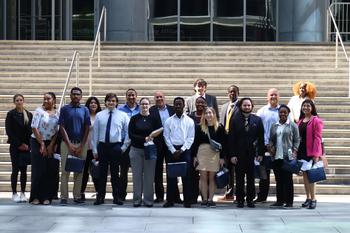
Sarai Lopez is learning about monetary policy and its impact in her economics class at UNC Pembroke.
However, the complex theory about how central banks change the money supply to accomplish specific economic objectives became crystal clear to Lopez and her finance and accounting classmates during a recent field trip to the Charlotte branch of the Federal Reserve Bank. While uptown, the students toured Bank of America's corporate headquarters, met with executives and learned about various internship opportunities.
"It was cool to see the correlation between what we are learning in the classroom in a practical setting," said Lopez, a freshman. "I would encourage other students to go on these trips. These are experiences you don't often get outside of college; your professors can only teach you so much. It's good to network with people in these roles who work in the areas you want to work in."
The Federal Reserve System––the United States’ central bank––comprises 12 regional banks and 28 branches. Its primary responsibility is to keep inflation low. The Charlotte branch is a five-story building, including a three-story underground steel-encased vault with millions of dollars. The vault, which is as wide as two basketball courts, contains dozens of bins stacked from floor to ceiling. The bins could hold up to $28 million at any given time. Students got to see where bills are stored, shredded and examined.
"It was fascinating to learn all the functions of the Federal Reserve and how they are the bank for the banks," said Madison Swallow, a junior accounting student. "They walked us through every process and gave us a presentation. It was great to hear them talk about information like investment and portfolio analysis, which matches what we've been learning in our finance class. It's a blessing to see how what we learn in class correlates to real life," Swallow said.
The Charlotte trip is one of many ways UNCP students gain experiential learning––more commonly known as learning by doing. These valuable opportunities are a significant fabric of the student's college experience.
Mathew Neuschafer, junior accounting major, said being exposed to the inner workings of the Federal Reserve and interacting with top financial investors was invaluable. Still, above all, he benefited greatly from making the connection to classroom lectures.
In our economics class, we've been discussing inflation rates and how whenever someone goes to a bank to make a withdrawal, they must go to Fed Reserve to get money," Neuschafer said. "It's a lot about supply and demand and inflation and a lot of that is correlated with the Federal Reserve and how they must ensure inflation rates don't go too high or drop too low."
"It's one thing having them come to our campus and talk to us about what they do, but seeing the process for ourselves is another. Some things are difficult to explain in words, so being there in person and walking around their facility is a different experience. It was very memorable," Neuschafer continued.
Dr. Jeff Bolles, assistant director of the MBA program, was among the Thomas College of Business and Economics faculty who joined the students on the day trip.
"This was a very dynamic and engaging event for our students," Bolles said. "They were highly attentive and asked a lot of good questions. At Bank of America, they were able to make some strong connections with professionals in the industry."
The trip was informative and hopefully will open the doors for future careers. However, as Swallow and Neuschafer eluded, the students will benefit the most from the experiential learning aspect, according to Bolles.
"The thing about a lot of students who go through econ is that they don't necessarily grasp all the theoretical pieces, so this trip provided them with practical knowledge," Bolles said. "In theory, you can talk about it in class, but when you get in there and you see what they're doing and you start saying 'ok, there is a process of weeding out bad money and banks have to go through the process of acquiring money, so the students got a really good practical understanding of the economy and how things work."